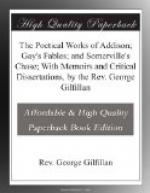In 1720 he published his “Poems” by subscription. The general kindness felt for Gay, notwithstanding his faults and feebleness, now found a vent. The Prince and Princess of Wales not only subscribed, but gave him a liberal present, and some of the nobility, who regarded him as an agreeable plaything and lapdog of genius, took a number of copies. The result was that he gained a thousand pounds. He asked the advice of his friends how to dispose of this sum, and, as usual, took his own. Lewis, steward to Lord Oxford, advised him to entrust it to the funds, and live on the interest; Arbuthnot, to live upon the principal; Pope and Swift, to buy an annuity. Gay preferred to sink it in the South-Sea Bubble, then in all its glory. At first he imagined himself master of L20,000, and when advised to sell out and purchase as much as his wise friend Elijah Fenton said would “procure him a clean shirt and a shoulder of mutton every day,” rejected the counsel, and in fine lost every farthing, and nearly lost next, through vexation, either his life or his reason.
Pope, who occasionally laughed at him, was now very kind, and partly through his assiduous attention, Gay recovered his health, spirits, and the use of his pen. He wrote a tragedy called the “Captives,” and was invited to read it before the Princess of Wales. The sight of her and her assembled ladies frightened him, and in advancing he stumbled over a stool and overthrew a heavy japan screen. How he fared afterwards in the reading we are not informed; but as we are told that the Princess started and her ladies screamed, we fear it had been poorly. On this story Hawkesworth has founded an amusing story in the “Adventurer,” and it was also, we think, in the eye of the author of the humorous tale, entitled “The Bashful Man.” This unlucky play was afterwards acted seven nights, the author’s third night being under the special patronage of her Royal Highness.
At the request of the same illustrious lady, he, in 1726, undertook to write a volume of “Fables” for the young Duke of Cumberland, afterwards of Culloden notoriety, and when at last, in 1727, the Prince became George II., and the Princess Queen Caroline, Gay’s hopes of promotion boiled as high as his hopes of gain had during the South-Sea scheme. But here, too, he was deceived; and having only received the paltry appointment (as he deemed it, though the salary was L200,) of gentleman-usher to the Princess Louisa, a girl of two years old, he thought himself insulted. He first sent a message to the Queen that he was too old for the place,—an excuse which he made for himself, but which, being only thirty-nine, he would not have borne any other to make for him. He next condescended to court Mrs Howard, the mistress of George II., and that “good Howard” commemorated in the “Heart of Mid-Lothian;” but this too was in vain, and then he retired from the attempt, growling out probably (if we can imagine him in fable, not as Queen Caroline called him the “Hare,” but a Bear) the words, “Put not your faith in princes.” He was the more excusable, as, two years before, Sir Robert Walpole had, for his surmised Toryism, turned him out of the office of “Commissioner of the Lottery,” which had brought him in L150 a-year.




